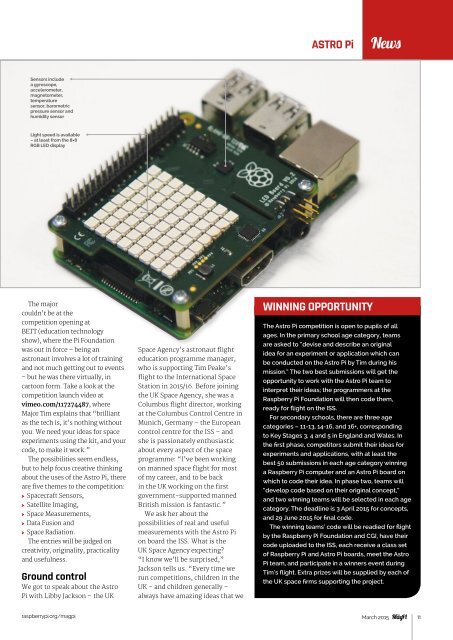Create successful ePaper yourself
Turn your PDF publications into a flip-book with our unique Google optimized e-Paper software.
ASTRO Pi<br />
News<br />
Sensors include<br />
a gyroscope,<br />
accelerometer,<br />
magnetometer,<br />
temperature<br />
sensor, barometric<br />
pressure sensor and<br />
humidity sensor<br />
Light speed is available<br />
– at least from the 8×8<br />
RGB LED display<br />
The major<br />
couldn’t be at the<br />
competition opening at<br />
BETT (education technology<br />
show), where the Pi Foundation<br />
was out in force – being an<br />
astronaut involves a lot of training<br />
and not much getting out to events<br />
– but he was there virtually, in<br />
cartoon form. Take a look at the<br />
competition launch video at<br />
vimeo.com/117274487, where<br />
Major Tim explains that “brilliant<br />
as the tech is, it’s nothing without<br />
you. We need your ideas for space<br />
experiments using the kit, and your<br />
code, to make it work.”<br />
The possibilities seem endless,<br />
but to help focus creative thinking<br />
about the uses of the Astro Pi, there<br />
are five themes to the competition:<br />
> Spacecraft Sensors,<br />
> Satellite Imaging,<br />
> Space Measurements,<br />
> Data Fusion and<br />
> Space Radiation.<br />
The entries will be judged on<br />
creativity, originality, practicality<br />
and usefulness.<br />
Ground control<br />
We got to speak about the Astro<br />
Pi with Libby Jackson – the UK<br />
Space Agency’s astronaut flight<br />
education programme manager,<br />
who is supporting Tim Peake’s<br />
flight to the International Space<br />
Station in 2015/16. Before joining<br />
the UK Space Agency, she was a<br />
Columbus flight director, working<br />
at the Columbus Control Centre in<br />
Munich, Germany – the European<br />
control centre for the ISS – and<br />
she is passionately enthusiastic<br />
about every aspect of the space<br />
programme: “I’ve been working<br />
on manned space flight for most<br />
of my career, and to be back<br />
in the UK working on the first<br />
government-supported manned<br />
British mission is fantastic.”<br />
We ask her about the<br />
possibilities of real and useful<br />
measurements with the Astro Pi<br />
on board the ISS. What is the<br />
UK Space Agency expecting?<br />
“I know we’ll be surprised,”<br />
Jackson tells us. “Every time we<br />
run competitions, children in the<br />
UK – and children generally –<br />
always have amazing ideas that we<br />
WINNING OPPORTUNITY<br />
The Astro Pi competition is open to pupils of all<br />
ages. In the primary school age category, teams<br />
are asked to “devise and describe an original<br />
idea for an experiment or application which can<br />
be conducted on the Astro Pi by Tim during his<br />
mission.” The two best submissions will get the<br />
opportunity to work with the Astro Pi team to<br />
interpret their ideas; the programmers at the<br />
Raspberry Pi Foundation will then code them,<br />
ready for flight on the ISS.<br />
For secondary schools, there are three age<br />
categories – 11-13, 14-16, and 16+, corresponding<br />
to Key Stages 3, 4 and 5 in England and Wales. In<br />
the first phase, competitors submit their ideas for<br />
experiments and applications, with at least the<br />
best 50 submissions in each age category winning<br />
a Raspberry Pi computer and an Astro Pi board on<br />
which to code their idea. In phase two, teams will<br />
“develop code based on their original concept,”<br />
and two winning teams will be selected in each age<br />
category. The deadline is 3 April 2015 for concepts,<br />
and 29 June 2015 for final code.<br />
The winning teams’ code will be readied for flight<br />
by the Raspberry Pi Foundation and CGI, have their<br />
code uploaded to the ISS, each receive a class set<br />
of Raspberry Pi and Astro Pi boards, meet the Astro<br />
Pi team, and participate in a winners event during<br />
Tim’s flight. Extra prizes will be supplied by each of<br />
the UK space firms supporting the project.<br />
raspberrypi.org/magpi March 2015<br />
11


